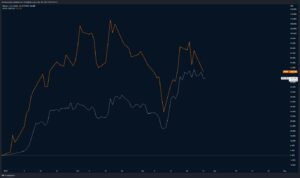MicroStrategy repays $205 million debt-obligation with a 21% discount

In an 8-k filing form to the SEC last Friday, Bitcoin evangelist and MicroStrategy chairman Michael Saylor showed the company paid off its $205 million loan to now-defunct Silvergate bank. Not only was the loan repaid two years in advance of maturity, but it also facilitated another round of bitcoin purchases.
Prepaid loan discount facility
Two weeks following Silvergate’s voluntary liquidation to pay off creditors, the bank’s remaining ties to Michael Saylor were cut last week. On March 23, 2022 Silvergate issued a $205 million loan to MacroStrategy (a subsidiary to MSTR). The loan was collateralised with 34,619 Bitcoin, tying the firm’s balance sheet to Bitcoin’s performance.
When Silvergate went bust, MSTR assured investors that the defunct bank wasn’t a custodian, and that the company had no more affiliation with the bank. On March 24, 2023, concerns were officially put to rest with an 8-k filing to the Securities and Exchange Commission.
Per the filing, MacroStrategy paid the load under heavily discounted terms at $161 million. This 21.46% discount was arranged under the Prepayment, Waiver, and Payoff to Credit and Security Agreement well in advance of the loan’s maturity date on March 23, 2025. This provision is normally included as it is beneficial to either party.
On the one hand, the borrower avoids additional fees and prepayment penalties. And on the other hand, the lender accesses additional liquidity from principal repayment in advance of the due date.
MSTR Picks up more BTC
Besides the favourable loan repayment terms, MicroStrategy also used the excess proceeds to pick up more Bitcoin. MSTR and subsidiaries purchased an additional 6,455 BTC for $23,238 per Bitcoin, totalling $150 million.

The move elevated the company’s holdings to 138,955 BTC, bought at an average price of $29,817 – worth around $4 billion presently. Following last year’s jaw-droppingly poor performance of -57%, MSTR stock has now managed to turn the page as it follows in Bitcoin’s footsteps.

Saylor Manages Debts
Following a ~$1 billion loss in impairment charges on Bitcoin holdings Michael Saylor stepped down as MSTR’s CEO in August 2022. Presently, Saylor occupies an Executive Chairman position at the company and functions as one of Bitcoin’s chief evangelists.
In September 2022, despite the ongoing sell-pressure from a variety of macro-economic factors and fraud, Saylor forecasts a $500,000 Bitcoin price within a decade. The figure wasn’t pulled out of thin air. Instead, he compared Bitcoin to gold and divided its ~$10.5 trillion market cap by Bitcoin’s supply of 21 million coins.
Saylor’s MicroStrategy became the first publicly traded company to develop an all-in Bitcoin strategy. In August 2020, the company picked up its first batch of 21,454 BTC at $250 million using its cash reserves. That same year in December, MSTR finalised a $650 million convertible bonds offering due in 2025. Then in February 2021, the company finalised a $1.05 billion convertible bond offering at 0% coupon and a 50% conversion premium.
This financial instrument is a debt security which can be changed into shares at a later date. The bond offering allowed MSTR to raise capital without diluting its shares, with the proceeds being used to purchase Bitcoin.
This debt-based strategy has a long-term outlook which extrapolates on Bitcoin’s ‘sound money’ properties in relation to the inherent instability of central banking, such as inflation, fractional reserve banking and financial or political censorship.
While Bitcoin is volatile in Dollar or fiat terms, Saylor relies on this double-edged sword to infer future successes. Notably, Bitcoin’s historical performance is a testimony to its anti-fragile characteristics. Between 2012 and 2023, BTC outperformed inflation hedges by a significant margin.

Under ex-Goldman Sachs banker Gary Gensler, the United States Securities and Exchange Commission, along with other administrations have gone to great lengths to stifle, discredit and prevent Bitcoin’s further expansion by blocking access wherever possible. Under the false-pretence of investor protection, the regulator rejected every single SPOT Bitcoin ETF application for a decade, all the while allowing riskier futures ETFs into the market.
However, this abrasive stance against Bitcoin has failed to kill it off. Grayscale has even gained legal ground in court against the SEC. Despite the crackdown and ‘operation chokepoint 2.0’, as well as the shutdown of crypto-facing banks (Silvergate and Signature), a Bitcoin ETF would open the floodgates to traditional investors who aren’t comfortable being custodians of their own BTC holdings.
A Bitcoin ETF would also cement the asset with an air of institutional legitimacy. As the US banking crisis worsens, the allure of scarce, hard assets is in contrast to proposed Central Bank Digital Currency rollouts, which promise a dystopian nightmare as admitted by their own proponents.






